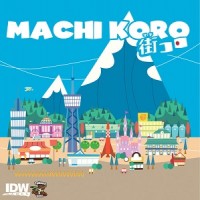
Machi Koro
Overview
Machi Koro is a fast paced game of city building. Two to four players starting with only two establishments will roll dice to earn income, purchase more Establishments and hope to be the first to build their city’s Landmarks. Each Establishment and Landmark has a special ability that activates when a certain number is rolled on the die, so you can never be certain whether you will be helping yourself or your opponents. The first player to build their four landmarks wins!
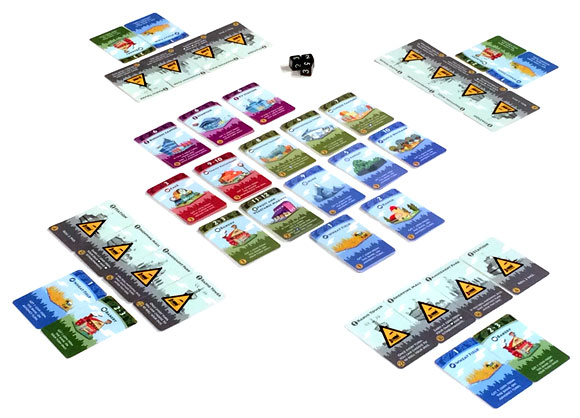
The Cards
To understand the game you have to understand the cards. There are two basic types of cards in Machi Koro: Establishments and Landmarks.
Establishments
These cards have a number (or range of numbers) printed across the top and provide Income. There are four different color Establishment cards. Each color determines how Income is paid:
- Blue (Industry): This Establishment pays income to the owning player during any players’ turn.
- Green (Shops Factories and Markets): This Establishment pays income to the owning player during that player’s turn only.
- Red (Restaurants): This Establishment pays income to the owning player from the person who rolled the dice. (Ouch)
- Purple (Major Establishment): This Establishment pays income to the owning player from all other players, but only during the owning player’s turn. (Big Ouch)
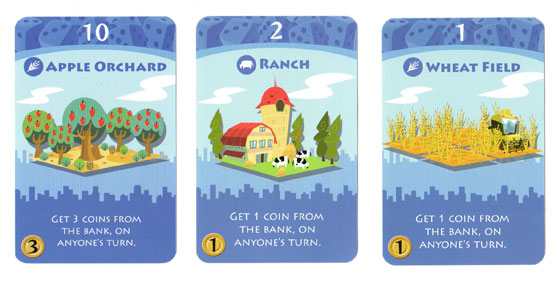
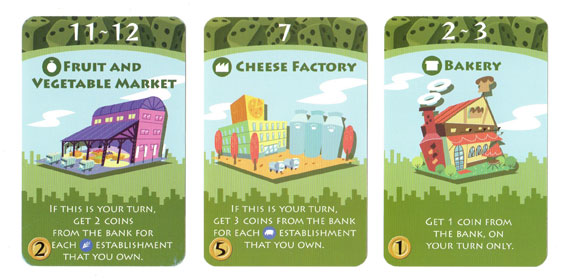
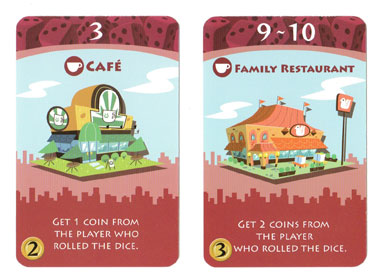
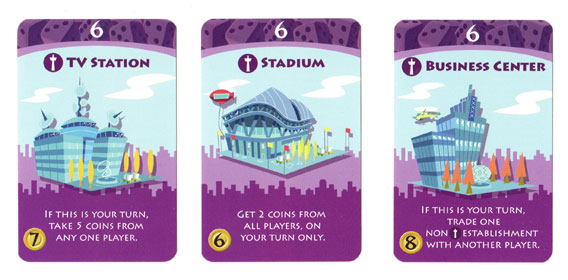
Landmarks
These are the cards that start off face down, but when purchased, add an effect for the owning player:
- The Station: allows a player to roll two dice instead of one.
- The Shopping Mall: earns the owning player an additional coin from Cafés and Restaurants.
- The Amusement Park: allows a player to take an extra turn if they roll matching numbers with two dice.
- The Radio Tower: allows a player to re-roll their dice once each turn.
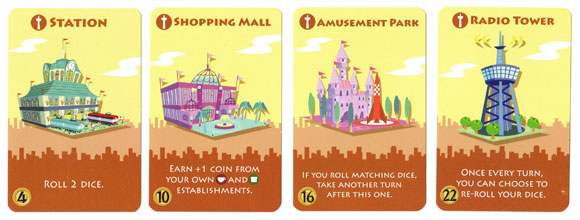
Ok ok… how do you play?
Players start with a Wheat Field and a Bakery in play and their four Landmark cards face down. The rest of the Establishment cards are grouped together and laid out for all to see. Each player starts with 3 coins. During your turn you roll a die (or dice later in the game), then potentially earn Income. The number rolled (total of the dice if two are rolled) is referenced with the numbers across the top of the Establishment cards and Income is paid out based on the number rolled.
Simple right? Sure, at first. In the beginning of the game each player only has a Wheat field and a Bakery. So if a “1” is rolled, all players earn one coin (From the blue Wheat Field). If a 2 or 3 is rolled, the player whose turn it is earns one coin if they own the Green Bakery.
Once each turn, you may purchase one Establishment from the Pool of available Establishment cards. Simply pay the cost in the lower left corner and place the Establishment in front of you. Your city just grew! This will key off of future die rolls and earn you even more Income.
And so it goes, each turn dice are rolled, adding to (or taking away from) player’s fortunes until one player has enough income to pay to flip their fourth Landmark card and stand and gloat over the other players!
Who would enjoy this game?
Final Thoughts
What a dandy little game from Masao Suganuma! Some key elements make it irresistible.
First, a ridiculously simple game turn where you roll a die and read the results makes the game instantly playable and all players begin the game with an exact even chance to succeed. It’s the strategy that emerges during gameplay that takes the game to another level.
Establishment cards vary from the very basic, (A Ranch where you get one coin when anyone rolls a “2”) to the ridiculously mean, (A Family Restaurant where you get two coins from the player who rolled the dice – very awful when it’s your turn and everyone ELSE has a Family Restaurant… or two). Some cards key off of others. (The same Ranch card has a small “cow” icon and the green Cheese Factory pays 3 coins for each “cow” establishment you own.) And so on. Building your city wisely is key. And yes, all Income hinges upon the roll of the die. For this reason, two considerations that emerge from this is when to roll one or two dice, and when to purchase higher numbered buildings.
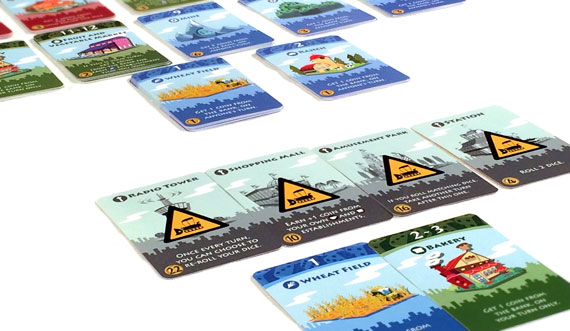
The more powerful cards in the game require a roll higher than 6. So you’ll start off rolling that one die and hoping for the best. But as your city grows, you will want to build that Station Landmark, move away from the single die and start trying to get the big numbers. This is a key strategic moment in the game. Each turn, you can decide to add to the lower numbered Establishments, and roll one or two dice. (Keeping in mind you can roll 2-6 on two dice as well!) This is also affected by what other players are buying! If your opponents start to get those big numbered Establishments, you may feel safer rolling one die. This is an elegant mechanic that produces great emergent strategy.
Lastly, you don’t have to build your Landmarks in order of cost. Building the Radio Tower early, (22 Coins!) can have you re-rolling die every turn, but it’s expensive so you will be in a standstill while your construction workers complete the huge project.
This combination of luck and strategic choice (along with the cute artwork from Noboru Hotta) is what makes the game just so darned alluring. It can be a bit repetitive after several plays, but wait! There is an expansion promised (Machi Koro Plus!) that will double the number of cards in the fall.
Highly recommended for a crisp, quick, city-building game.
Add a Review for "Machi Koro"
You must be logged in to add a review.


Settlers of Catan (aka Catan) is an ever green, must play, phenomenon of the gaming universe. Dominion is the Grand Daddy of Deck Builders. When folks ask me to describe Machi Koro, I often say it’s like Catan & Dominion has a baby in Japan. Is there more to the game than that? And does Machi Koro suffer from similar issues as those other games?
Components
These are some pretty cards stuffed in to a HUGELY over sized box. And while I understand that it’s to make room for expansions, and to look better on a shelf…the box is way too big. Even with expansions.
As for the cars themselves? This is a game that should likely be sleeved. Playing multiple copies with a fair amount of plays (including my local game cafe) the cards are thin, show wear, and…have colour and sizing issues with expansions.
That’s not to say that the game isn’t playable, or that you’ll notice this a lot when playing. But…this isn’t up to high standards other companies are setting.
Set-Up
Players place their 2 starting Establishments (Wheat Field & Bakery) face-up in front of their play area, and their four Landmark cards face down.
Next, create a marketplace for all of the remaining Establishments. Each Establishment gets it’s own pile, and it’s helpful to place them in order of number.
Each player gets 3 coins with the remaining money making up the bank.
Determine a starting player and begin play.
Game Play – Basics
Players take turns in a clockwise order, performing three actions: Roll Dice; Earn Income; & Construction.
Players roll one or two dice. Once the results are own, players earn income (money from the bank) from and purchased Establishments. Players can them purchase an Establishment from the marketplace OR a landmark. Players can only purchase one item put turn. Once they have purchased or passed, the dice are passed to the next player.
Play continues until one player has constructed all of their landmarks.
Game Play – Advanced Tactics
There are 4 types of establishment cards:
1) Restaurants (Red)
2) Secondary Industry (Green)
and Primary Industry (Blue)
3) Major Establishments (Purple)
Red cards take money from another player on their turn. Green earn income ONLY on your turn. Blue earn income on any players turn. Purple cards are special cards that earn income in unique ways on a players turn only.
It’s important to remember that during the income phase, cards are determined by the order of Red, Green, Blue, and Purple. This is important as it means a player can end up having no money to give out from another player’s red card, and then get income from a blue card.
Also of note is that cards have combo abilities. For instance some cards get $5 for ever other card of a similar type you have. This is important as it’s possible to build up an engine that can score $15 or more on a single dice roll.
Theme
If you are looking for theme…you might want to move on. While all the cards look nice (until they suffer from wear and tear), and have names that fit the theme, this isn’t going to shine through when you play the game.
But much like Splendor and other games, that doesn’t take anything away from the game.
Replay Value
Much like Dominion, Machi Koro (without expansions) is a race to build an effective engine faster than your opponents. You still need the dice to come up in your favour, but given the numbers that need to be rolled to activate the 2 most common engines in the game are 6 & 8…luck isn’t that big of a factor.
So the base game has limited replay value.
However, the designers seemed to clue in to this and the first expansion fixes most of these issues by changing more to a Ascension/Legendary style marketplace and with new cards that help avoid the main engines of the base game.
Over All Impression.
When talking about Machi Koro, I have to bring up the the Harbor Expansion is a MUST have for the game. So my final thoughts are in two parts.
Without the expansion Machi Koro will wear out it’s welcome MUCH faster than Catan or Dominion, and isn’t much of a new experience.
With the expansion? It still falls flat in all the same ways Catan does, and Deckbuilders can. The randomness of the dice and cards can be a double edge sword against strategy.
In both cases the game can also suffer from the race taking too long. at it’s best Machi Koro is a 100m race: quick and exciting fun that delivers it’s fun and allows you to move on. If the dice don’t go the right way? Or if the cards don’t show up when playing with the first expansion? The game can drag.
That being said…this is a good game to use as a entry level game, or end of night game. It can also be an effective change of pace after playing a more intense game. And while the game won’t make my personal Top 10 for fans of Catan and Dominion this is going to go over REALLY well.
Japanese board games have become very popular in the last few years, most notably Love Letter and Trains, both published by Alderac Entertainment Group and both winners of Origins Awards in 2014. What this means is that new Japanese board and card games are hotly anticipated, none more so than Machi Koro. In English, it is released by IDW Games, a publisher better known for its comic publishing. Machi Koro is a quick-playing ‘dice and card’ for two to four players, aged eight and up, in which they are each the mayor of a suburb whose residents want their district developed. Starting off with a Wheat Field and a Bakery, each player will race to build four landmark buildings—a Station, a Shopping Mall, an Amusement Park, and a Radio Tower. The first mayor to do so is the winner!
The playing time is thirty minutes and very simple. On his turn a player rolls the die and everyone will compare the result with numbers printed at the top of the building cards they have in front of them. This can generate money for everyone or just the current player, who is now free to spend it to purchase a new building or a landmark. A player can have multiples of one card type, but can only buy one card per turn.
Where Machi Koro gets interesting is how the cards generate money. There are four types. Blue cards pay out to everyone when their numbers are rolled; green only pay out on a player’s turn; red cards take money from other players when they roll their numbers; and purple cards provide an action rather an a pay-out. Note that red and blue cards pay out even when it is not a player’s turn. For example, the blue Ranch cards pay everyone one coin when anyone rolls a one. The green Bakery pays out one coin on a roll of two or three on the current player’s turn only. The red Café allows a player to take a coin from the current player when he rolls a three. The purple Business Centre allows a player to swap one of his buildings with that of another player.
Initially a player will be only rolling one die. If he purchases the Station landmark, he can roll one die or he can roll both dice. This means that range of results is no longer one to six, but two to twelve, and it means that as soon as they are built, a new range of buildings and their dice results are available to him. The cards with ranges above five tend to be more expensive and have more complex effects, especially results for six, seven, and eight. For example, the green Cheese Factory, which costs five coins, pays out three coins for each card the current player has with a cow symbol on it—currently only a Ranch—any time he rolls a seven. Building the landmarks will also give a player a benefit. The Station allows him to roll two dice; the Amusement Park lets him roll again if he rolls doubles, and so on.
Although designed for between two and four players, Machi Koro works better with three and four rather than two, primarily because there more participants for the cards to work off. Physically though, Machi Koro is nicely presented. The artwork on the cards is cute, the cards are easy to read, and the rulebook is very clear and very simple. The box comes with room for expansions, but the insert could have been better designed for that.
There have been comments that it is like Settlers of Catan without the trading or Monopoly without the mortgages. To an extent this is true. You are rolling for resources (coins) and you are buying properties as in both of those games, Machi Koro is a quicker, slicker game without the trading and without the mucking about with the banks. It is certainly better than Monopoly and whilst no Settlers of Catan, it is a well-designed little game. However, it is not perfect, but the first imperfection is not of Machi Koro’s own making. The first problem is that the game is slightly disappointing, but that can be put down to it having been overly anticipated, it having taken a year to reach us since it first appeared at Essen in 2013. Second is that its game play does not offer a great deal of depth or variety. Third, it does not offer much in the way of strategy and the primary means of getting money—the purchase of Ranches and Cheese Factories (the latter with its average roll of seven)—is obvious and difficult to counter. What game needs is an expansion and it needs it now. Two have been released in Japan—Machi Koro Sharp and Machi Koro: Harbor Expansion—and they need to be released in English before Machi Koro loses its popularity.
Now despite all this, Machi Koro will appeal to a wide audience. There one or two strategies in the game that a seasoned gamer will latch on to, but the dice rolling gives it a luck factor that will offset that to give everyone a good chance of winning. So amongst gamers it can be played to a cut-throat finish, but it also be played as a casual game. It is easy to play, it is fast to play, and it is easy to teach. This, when combined with thoroughly charming artwork means that Machi Koro is a good family game and if not quite a good gateway game, then it is very, very close.
I first saw this game in the back of a My Little Pony comic I was reading to my kids. I admit the game didn’t appeal to me, likely because of where it was advertised. Snobbish of me? Yes and I was foolish to be so.
A few months ago, my kids and I were in a board game café, they recognized the game from the MLP comic, so we gave it a whirl.
I was immediately enchanted by the game’s simplicity and its clean, cartoonish art.
The game is exceedingly simple:
Everyone starts with four undeveloped “landmarks” (train station, shopping mall, amusement park, radio tower) and two resources (wheat field and bakery).
All of the supply cards, numbered 1 through 12 (some have more than one number, such as the bakery, which carries “2-3”) are sorted in their respective numerical stacks. So all of the 1’s together, 5’s together, etc.
Everyone gets three coins and away we go.
Until you develop the train station, which allows you to roll two dice, you will roll a die on your turn. If the die face matches a card, resolve the effect and see if you earn or lose income. Then determine if you have the loot and want to buy a card from the supply (good idea to buy cards…maximize your chances to build up your coins and take coins from others).
The first person to build all four landmarks wins.
The supply cards come in four colours: blue earns income on anyone’s turn (eg if you roll a 1, everyone will earn a coin from their respective wheat fields); red takes coins from whoever rolled the die or dice; green earns you income on your turn only; purple scores you income from your opponents but only on your turn.
That’s all there is to it. You can teach it in minutes. In fact, it can be taught faster than you can set it up.
Obviously the die and dice rolling add randomness but I enjoy how benefits/losses are spread around: you can earn on your turn, everyone can earn on your turn, you can lose money on someone else’s turn, others can lose money on your turn.
The strategy comes into play when deciding which supply cards you wish to purchase. You’ll be rolling a single die until you can afford to develop the train station (costing a mere 4 coins), but the other landmark cards have interesting benefits as well. Which to choose first? Do you go with your usual play-style or get a read of the table and see how your opponents are playing?
Do you pick supply cards based on the probability of oft-appearing dice values (for those Catan players, remembering the probability pips on the dice rolls chips may help you) or which cards will earn bigger bucks? Do you play a defensive game and focus on your play area or pick up a bunch of red and purple cards so you can put a dent in your opponents’ cash piles?
Lots of options.
And with the Harbor and Millionaire’s Row expansions, you get new landmark cards, new supply cards, and a new way to lay out the supply cards that randomizes what’s on the table.
Now to the pros and cons:
Pros:
• A fast and simple game that can either be an appetizer for the main event or multiple games over the evening.
• Kids love it. Cozy pictures, fast game-play (could be some AP though. See below), straightforward rules, not a ton of literacy or numeracy needed so the wee ones can join in. My 6-year-old son adores this game. When he says “Dad can we play Machi Koro?”, how can I refuse?
• Chance figures significantly in this game, but there is a good amount of strategy when deciding what to buy when.
Cons:
• Some may feel the replay-factor of the base game is limited. But this is overcome with the expansions. I bought the nifty deluxe tin. Has everything and looks cool. I like shiny things. Squirrel!
• Power gamers may feel a touch bored. But maybe not. I went down this hobby rabbit hole quite some time ago and I adore the simplicity of this game. As with all games though, à chacun son goût.
• Depending on who is playing, there will be those who agonize over what to purchase from the supply. You can either hustle things along verbally (as my family is wont to do) or go with the flow until everyone gets comfortable with the cards.
• When someone is on a roll, the cash that person can amass can make the game feel lopsided. A good option is to snap up a few red and purple cards and see if you can put a dent in his wallet.
Verdict:
A fun, engaging, simple game that is well worth the low sticker price. This will appeal to a variety of gamers and I recommend it especially for the family gamer’s shelf.
My wife and I play board games once we’ve put the baby to bed. It’s a quiet, non-tv related activity that we enjoy doing together at night. She is probably described as a casual gamer like me, but is a bit more competitive. She dislikes learning new games and it usually takes her 2-4 plays to actually start enjoying a new game. We both loved Machi Koro from the first roll of the dice.
Lightning Review
A simple, fast, and easy to learn, dice game with quick turns, lots of luck, and some meaningful decisions. If you are looking for a highly strategic game, this isn’t it. If you don’t like dice, then this may not be a good fit. There are some strategies that give you a much better chance of winning, but variations in the game can change strategies and increase replay value. If you are looking for a fun game that is great for a family game night, or to play with a few casual gamers, then this is a good one to get.
Longer review
Game Play
A few people have covered the gameplay, and the rulebook is superb, so I will keep it brief. Ultimately, you are trying to build the 4 landmark cards, the first person to do this wins the game. In order to do this you need a lot of money. In order to get money, you need to construct buildings that earn you money. Each turn you roll a die (or dice). The number on the dice activates certain cards. These activated cards earn you money or allow special actions. After you collect the money, you can build 1 structure with your money. Then it’s the next person’s turn.
Variable Rules:
The rulebook says to have all cards available, so that anyone can buy them at any point in the game, given you have the money available. I think this is an excellent way to learn all of the cards and possible strategies. A good way to teach beginners the game. However, there is no reason why this can’t be changed up. Using the Harbor Expansion rules adapted to this game will increase replay value. Additionally, you could limit the number of cards for certain buildings to make it less likely for a big payout (If playing with 2 players, remove 2 cards from each stack, so that there is less chance of a gigantic, and unbalanced payout). There are a lot of other possible variations. This slight tweaking of the rules makes the game more exciting and increases replay value.
Pros:
-Simple and light game.
-Easy to learn.
-Wonderful artwork.
-Variable gameplay.
-Fast turns, with exciting dice rolls.
-Meaningful decisions on your turn.
-Great rulebook.
Cons:
-Certain strategies are better than others.
-Initial gameplay can feel stagnant after a while.
-Components aren’t great. Cards are a little thin, and coins are cardboard.
-Dice rolling. You could possibly just be unlucky for the entire game, but this is unlikely.
Conclusion
There are 2-3 strategies that are statistically better than the others and it’s easy to pick up on these strategies after the first play through. But, since everyone goes after these cards, it sometimes becomes the other less statistically significant cards that win you the game. Additionally, lucky dice rolls, Purple Card abilities, landmarks and the strategies for getting those statistically powerful cards also play a big factor. We found that removing 2 cards from each type of building is a must for 2 player, it forces you to have to save up money instead of just sitting back and waiting for a ridiculous payout.
I really enjoy this game. Sometimes the dice don’t go your way and that’s annoying, but when it does go your way it just is a great feeling. I play a lot of games 2 player with my wife. This is the first game that, after playing it once, she wanted to play it again and again. Even the next night, she wanted to go back and keep playing. It’s a game we can play with our parents and friends whether or not they are into games. The quick gameplay, appealing artwork, meaningful decisions, and exciting rolls make this an instant hit initially with most casual, family, and avid gamers. Almost every roll could benefit you so it keeps you into the action even when it’s not your turn. Also, trying out different set ups and rules make it fun to explore and play again and again, while still going back to original game play from time to time.
We have since started playing with the Harbor Expansion and prefer this way and will most likely continue to use the Harbor Expansion.
Machi Koro, one of the newer games in our collection, gets quite a bit of play due to its simple mechanics and easy rules. We picked it up after hearing a lot of hype around the gameplay and art.
What’s in the box?
The Machi Koro game components are really simple, consisting of a couple dice, some cardboard money tokens and a bunch of cards. The cards have really great art for each type of establishment. The box feels kind of empty when you first open it as there is definitely room for expansions.
How’s it play?
Machi Koror is very simple. Everyone starts with two cards (a bakery and a wheat field), three money tokens and four landmark cards (for future building). The object of the game is to be the first player to build all of your landmark cards. This is done by building more establishments in your town to generate more money. Each round a player rolls a die or dice and money is collected based on which establishments are built in your city. Blue establishments collect money on everyone’s turn, while green ones only collect on the players turn, red ones steal money on the dice rollers turn and purple ones collect money based on the card conditions. After money is collected the player can purchase a card from the market to add to their town or build one of their landmark cards. The landmark cards give the player a special bonus once they are built.
Overall Impression
At first I was really excited about Machi Koro. For us the playability with two people is really important and this game was initially great. It was even better when we got to play with three or four people. After awhile though we figured out the one die and ranch/cheese factory strategies and the replay factor went down for me. I still love the artwork and how simple it is for new gamers but I am less likely to suggest playing it multiple times in an evening. There are variations out there for randomizing the cards, which helps to vary strategies but I think once the harbour expansion comes out this game will take off for me again. Right now though the game still has an appeal if I am looking for something that is simple and easy to teach. So I would recommend that it gets played early in the night or between heavier strategy games. Happy Gaming!!
My family and I picked up this game a couple of weeks ago and it has quickly become a favorite. Here’s why Machi Koro claimed a spot so quickly.
1. It’s a light game. The game play is real simple. Roll your die/dice, collect/pay money, purchase a card/landmark, then pass the dice to the next player.
2. Lot’s of ways to win. Object of the game is to create the most income for your town, how you do that is up to you. Check out my tips/strategies to see what has worked for me.
3. Because some cards work when other people roll it keeps everybody in the game even when it’s not your turn. I like that some cards can negatively effect your competition so there’s a little nastiness which translates to fun.
4.It’s not a huge time commitment. Even with the expansions (we bought the deluxe version, definitely the best deal if your going to buy it)we can get a game done around 30 min.
The only negative thing I can think of is for people that are new or used to “traditional games” ie. Monopoly, Risk, Candy Land this game can seem overwhelming. (Lots of parts) I have found in most non-traditional games that after a couple of rounds of play this should dissipate and can quickly be enjoyed.
Get it, you won’t regret it.
Fast and easy. Machi Koro removes the numerical advantages on a board and so goes away the AP that makes Catan a slog to play through.
By offering interesting choices and by allowing you to customize a city. Machi Koro offers lots of strategic depth and does away with the less approachable aspects of economic board gaming. Machi Koro, like other economic games, offers more freedom than a classic board game. It does have one or two guaranteed strategies within the core box.
Machi Koro excels with at least one expansion, the core box will last you through 20-30 play throughs. This sounds like a lot, especially for the price tag, but with an expansion you can draft. Drafting makes the game feel like a hybrid between Catan and Dominion.
This game is my 2015 Economic game of choice and it will continue to be until something more interesting that is easier to teach pops up.
Machi Koro is game that’s easy to learn and quick to play, making it a popular choice for some casual gaming.
The simple mechanics of this card drafting game make it appealing to a wide audience of players. However, I would provide caution to those looking for something that involves more strategy than luck, as this may not be your cup of tea. You are always, ALWAYS, at the mercy of the dice. I can certainly attest to this after having played 3 consecutive games with my partner and not winning even one of those rounds, while being certain that my strategy to victory was secured.
The presentation of the game is great, as the artwork is cheery and colorful. My only critique is that for a game that retails at nearly $30, I would expect the components to be a bit more substantial, especially since there’s not too much that’s supplied in the box. The cards are a thin stock, and the cardboard for the coin tokens is susceptible to ripping if you don’t punch them out carefully.
Overall, Machi Koro is simple and enjoyable fun. Just be prepared to pray very hard to the Dice Gods if you’re aiming to win!
First of All…
I’m a power gamer, and I love this game! This isn’t just for families with 9 year olds.
Engine Building & Game Breaking
I love the engine building aspect of this game. Building your city is like putting together a puzzle that will eventually gain a mind of its own and finish itself faster than your opponents’ puzzle. One downside to this engine building, however, is the simplicity and lack of variety in the cards. “Breaking” the game was a quick and easy task. My method is to buy up the Ranches (the 2 cost with the cow on it), build my Station (for the dice rolling), and buy up Cheese Factories (3 coins/Cow establishment when you roll a 7). I’m telling you, this strategy seriously dominates. One major reason this is the best strategy is based on the 7. When rolling 2 dice, a final sum of 7 is the most probable outcome. This literally makes one able to calculate the best possible engine.
Take it to the Harbor
In my opinion, The Harbor expansion for Machi Koro is absolutely necessary. It takes this game to another level of gaming awesomeness. I will no longer play the base game alone for this one. The Harbor adds elements to the game that complete fix all of my previous problems. The cards are no longer all laid out to be dissected and purchased in the best order. Instead, the cards are all shuffled and put in a face down deck, coming out in random order based on a simple, but interesting dealing mechanic. Also, more cards are added that add complexity and card interaction to make many winning strategies possible.
Replay Value
With The Harbor expansion, the game has great replayability, due to the added cards and not knowing in which order they’ll hit the table.
Components
Just cards and coin chits. It’s all that’s needed, but nothing spectacular.
Ease to Learn
Very. The base game is especially easy to teach to children, although they will likely miss some of the more intricate card interactions.
In Closing
Buy Machi Koro. Play Machi Koro. Buy Machi Koro: The Harbor. Add Machi Koro: The Harbor to every game you play. Enjoy yourself!
Machi Koro is a fast moving, fun and light hearted game.
Very very easy to learn, and replay value is high as the light amount of strategy needed can vary game by game.
Some establishments pay out on your turn, some on others, some on all.
The goal never changes, but the way you get there could be different each time. It’s based on dice rolls that activate a number of cards.
I’ve rated the components a 3 start, only because the coins are cardboard. There isn’t much to the game for components, so I would have thought plastic coins would be in order.
I enjoyed the fact that not all numbers were accounted for on each method of payout. For example, some only pay on your turn.
My fear was this was more a kids game where “everyone gets a trophy”, but was proved otherwise by the way in which the establishments pay out.
Sometimes, nothing pays off.
It moves very quickly and you can get thru a full four player game in about 30 minutes. We like this aspect a lot, as often we have members in our group who show up later, or drop off early because of work schedules.
Despite this game not being a favorite for the strategy/wartime crowds out there, it moves fast enough that it’s not a huge time commitment allowing for a longer game later.
It’s also pretty fun to watch with the artwork being highly illustrative and fun. As fellow gamer had described it to me, it’s like Settlers of Catan minus the hate!
I was quite skeptical about Machi Koro at first because it sounded a lot like a game of Monopoly but without the board.
The concept of building properties and collecting money from specific dice rolls is there but it is so much more than that. I would call it a more refined version of the Monopoly concept.
What makes this game so much fun is the the evolution of your town as you build it more and more. Unlike Monopoly, where all your properties do the same thing, Machi Koro delivers the level of fun in more unpredictable ways.
Sure this game is almost completely dice rolling based but the concept of when you collect really makes it so much more entertaining. Every dice roll has us cheering or moaning. It doesn’t matter what the number is, every turn is eventful. And that is what makes Machi Koro have so much replay value. After finishing one game, I wanted to play it again immediately after. And after the first game, I wanted to change up my strategy especially after I learned about how certain business establishments give you a better Return on Investment compared to others.
This game can end fast or and longer but ultimately, if you everyone plays their cards right, they can have lots and lots of fun and in the end, you will be cheering.
For a dice rolling based game, Machi Koro really wins in every aspect of it. I can’t wait to play the expansion!!
I bought this game for my 6 year old. He loves it and so does the whole family. It’s a great family game. You can win with a single roll of the dice. You can also lose the big pot of money you have with the same roll.
The very basic idea of the game: You are the mayor of a city and you are to buy buildings (cards) for your city and then hope to roll or others will roll the number on top of your card to activate your building.
Blue Cards – The bank pays everyone with that card (example.. rolling a 1)
Red Cards – The roller pays everyone with that card (rolling a 3)
Green Cards – The bank pays only the roller (rolling a 2)
Purple Cards – Special cards that mess with the other players (rolling a 6)
Picking the right cards really is helpful, but it all depends of the die/dice roll. You select the cards you think sound great and then hope. I think its a great mechanic to keep the game random and yet you have some control. You could use the same card buying strategy in multiple games and not make any money or make money on every roll. It really balances the game out.
Highly recommend the game, and get the Harbor expansion
Machi Koro is a quick, easy game that is quite enjoyable. The object is to build four specific buildings that have increasing values. You start with two buildings (not the four you need to win) and gain money when the die/dice roll matches the numbers on the buildings you own. Some buildings gain money on any player’s roll while others only gain money when you are the player who rolled. Other buildings allow you to take money from other players. The four buildings you need to purchase have certain abilities that are unlocked when you purchase them (e.g. roll 1 or 2 dice, +1 coin to certain buildings, extra turn if you roll doubles) which in turn allows you to roll more numbers and gain more money.
The game requires strategy but also allows for a bit of luck which makes it more appealing to the casual gamer. This, combined with the ease it takes to learn and play, makes it a nice, quick game to play with limited time and/or with someone who isn’t quite an avid gamer.
Machi Koro is a light dice card game that plays from two to four players. It seems your town just held an election and you have been made Mayor.
The game is broken down into three phases. Roll Dice, Earn Income and Construction. The starting player rolls one of the dice. Based on the roll result, the different face up cards that the player owns can be activated. This is called the Earn Income phase. After earning income you can construct one property from the play area or complete one of your landmarks.
The more pieces of property you own, the more coins you can collect either from the bank or your fellow player. Once constructed, the Landmark cards give you extra bonuses such as more dice or more coins when certain cards are activated.
The player that constructs all four of their landmarks first wins the game. It’s that easy.
What do we like about this game?
Like I said, it’s an easy game to pick up and has some simple strategy so it fits nicely into the category of a gateway game.
What don’t we like about this game?
Since this is a dice driven game, you’re screwed if you don’t get the rolls, even if you have a great strategy planned. The card stock is good but the size of the box is totally overkill unless they plan on releasing a **** ton of expansions to keep in it.
You will have no problem picking this up.
Video Review
Check out our video review of this game: Gettin’ Higgy with Machi Koro
This has been our go to game lately. I play with my 9 yo and my wife. They enjoy the heck out of this game.
PROS:
It is super easy to teach/learn.
Not very expensive
Set up is easy (relatively easy)
Art is nice
CONS:
There are a lot of cards (not really a con but it slows down set up a bit)
There should be a holder for all the coins to use during game play.
We have had games won in as little as 15 mins and others that have taken almost an hour. I would definitely recommend this for people that are not big gamers but would like to start. Like the title says, fun.
This is a fun game that has a wide variety of choices and a healthy dose of luck. You start with a wheat field and a bakery. You also have 3 coins. You also have 4 cards “under construction” meaning you don’t get them until you have the money to pay for them. Every card in the game has game effects and also costs coins. The game effect is usually about collecting coins from the bank or other players. On your turn you roll 1 6-dided die. Later you will earn the choice of rolling 1 or 2 dice. After you roll collect or pay rewards based on what you rolled and then you can purchase 1 card. Card effects stack- for instance, a wheat field costs 1 coin to buy and pays 1 coin when you roll a 1. If you have 3 wheat fields and roll a 1 you would get 3 coins. Different cards are attached to different numbers. Cards are also colored and there is an order that cards are paid out in. Red cards, for instance, collect coins first from the player who just rolled and are paid out before other cards. This is important, because if you roll a number covered by a red card you will pay what you can and then collect from the bank so you will always have a chance to buy something. the game ends with the 1st player to build all 4 of his/her “under construction” cards.
Choose wisely on what order you build your special cards as the game effects will depend a lot on the choices others make. It is a fun, quick game I think you will enjoy.
Bought this game to introduce my friends to the world of board/card games. It was easy to learn and great to play a few rounds in one night. I can’t find it anywhere on this website but I completely recommend the Harbor Expansion Pack. It adds a bit more spontaneity to the game and cancels out the “one strategy fits all” road map that some players start to follow after player a few rounds of the original game.
General:
Machi Koro is a Japanese bingo style/easy to learn/card/city building/dice rolling game.
In the game some times your income is depended on other players dice roll as Monopoly, but this game is much more faster much more balanced and relaxing. Other than Monopoly which the main goal of the game is to eliminate the other players, the main goal of this game is to race for being the player who completes advancement of the city, first.
Components:
Cards: Absorbing graphic design of the city Establishments are friendly and illustrative and divers.(Use the plastic in the box to keep them organised).
Money Tokens: very simple and though cardboard tokens are used to pay the bank to construct establishment and pay other players for their cafes and restaurant establishments.
Dices: Dice roll results activate City Establishment cards effects and cards effect will be resolved in the order of Restaurants and cafes that make dice roller player to pay the cost to establishment owner/s then the cards with earning effects will be activated and then the advanced industries with special abilities will be activated, there are 2 normal 6 sided dice in the game and players start with one and after building Train station players may roll the second one, now players have chance to roll for more than “6” that activate more powerful cards effects.
Conclusion:
Machi Koro is a fast pace adorable card building game and is perfect for families, i suggest forget about Monopoly and play Machi Koro.
Played this the other day and I added it to my favourites on this website right away. This game was explained to me as Catan but with money and cards. It’s not too far off. The basic thing is you and your opponents are building towns and the first to build their 4 landmarks first is the winner. You do this by buying buildings to add to your city and then you roll a die or 2 if/when you get the landmark that grants that ability and then according to the buildings in you town you get money. You need to pay attention when it’s not your turn cause you can still get money on another player’s turn. There are 4 types of buildings- Green provides money when you have a building with the number you rolled, blue which provides money on anyone’s turn, red which you take money from the person who rolled that number and purple which you take money from the person when you roll the number. You can have multiple copies of each building except for purple ones and you may only make 1 purchase per turn. Good game and I highly recommend playing it if you get the chance or create the chance by buying the game.
No point giving a full breakdown as the main review says it all.
I would like to add that the Cartoon style artwork is fantastic. It’s simple dice rolling and if the number matches a card you have it will pay out.
4 types of colour cards in the game. BLUE pays all, GREEN pays the dice roller, RED steals from an opponent & PURPLE performs an action.
when you have enough money it allows you to purchase more cards which can then potentially earn you more money. The first person to build 4 landmarks wins.
I played this will my girlfriend who only really likes quick games. she picked it up on the first game and liked it. yet to play 3 player or more, but my first instinct is that this is going to be a big hit.
There is also an expansion played called the harbour coming out which you can find info on You Tube.